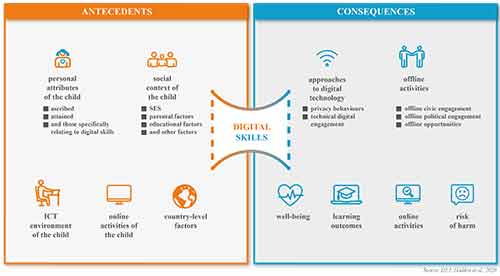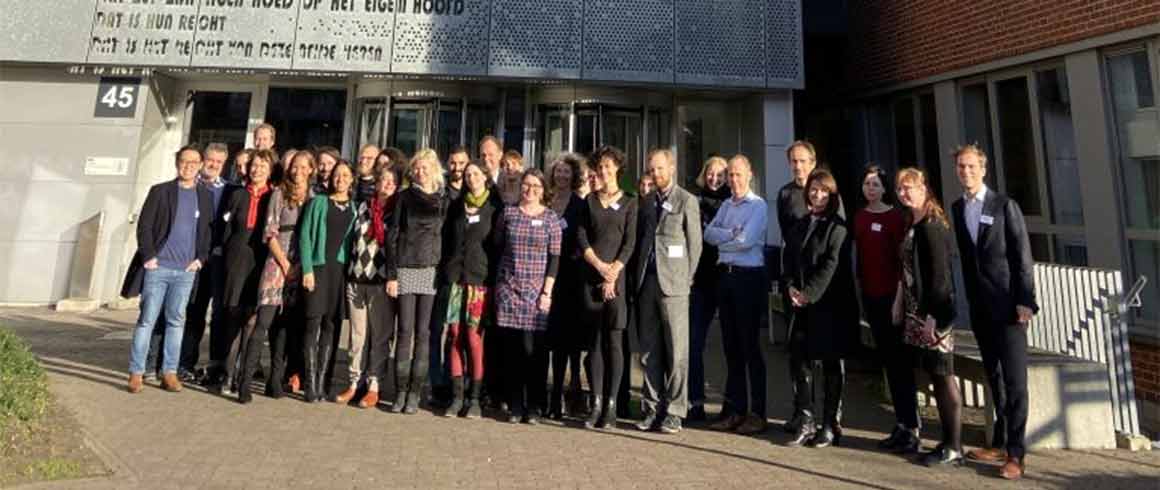di Davide Cino *
Significant findings come out from the Digital Skills, Risks and Wellbeing among European Children report (one of the two reports launched today by the ySKILLS project), led by Giovanna Mascheroni, professor of Sociology at Università Cattolica: preference for online social interaction is positively associated with digital skills, and feeling safe on the internet predicts digital skills in all countries but France, Italy, and Slovakia.
How can we improve the digital skills of children so as to maximise the tangible outcomes of internet use, while minimising its risks? What combinations of (operational, informational, social and content creation) digital skills improve children’s digital and social inclusion? What combinations of digital skills are more effective in reducing online risks? How does the relationship between different skills and different risks affect children’s experiences of harm? Can digital skills produce better protection from harm and foster children’s resilience over time?
These are the questions that the ySKILLS project aims to address, in order to generate new knowledge that would enhance the long-term positive impact of the ICT environment on multiple aspects of wellbeing (cognitive, psychological, social and physical) for all children.
The first objective of ySKILLS – namely, to acquire extensive knowledge and better measurement of digital skills – has been addressed through two research reports that have been launched today as part of WP2 activities.

Findings from a systematic analysis of the predictors and outcomes of digital skills in Europe
The first report Digital Skills, Risks and Wellbeing among European Children, was authored by a team of researchers led by Giovanna Mascheroni and based at Università Cattolica del Sacro Cuore and Masaryk University.
In the report, we further analysed nationally representative data from the EU Kids Online 2020 survey (Smahel et al., 2020) to explore what variables are associated with the digital skills of 12 to 16-year-olds from 17 European countries and what are the outcomes of digital skills on their positive and negative experiences of the internet.
Predictors of skills
The most surprising finding of our analysis on the predictors of digital skills is that preference for online social interaction (POSI) – namely, feeling more confident and safer when communicating online rather than face-to-face – is positively associated with digital skills. This finding challenges some adults’ view that online communication, including social media, is a waste of time.
A further significant predictor of digital skills – which received little attention in prior research – is feeling safe on the internet, which positively predicts digital skills in all countries but France, Italy, and Slovakia. It can be argued that the children feel safer online, engage in a wider range of online activities, which would support their acquisition of digital skills.
Consistent with prior research, however, the strongest and most common predictors of digital skills across countries were number of online activities and self-efficacy. Children who engage in more online activities – including communication, entertainment, learning, etc. – develop better digital skills. Self-efficacy – measured by children’s confidence in their ability to solve problems in daily life - is associated with digital skills in all countries to some extent, though the reasons why may vary and, due to the cross-sectional nature of the data, we cannot assume causal relationships. On the one hand, this finding may suggest that when children feel self-confident, this would positively reflect on their digital abilities. On the other, it may simply mean that more self-confident children also tend to positively rate their digital skills.
Restrictive parental mediation is negatively associated with digital skills in all countries. In other words, when parents limit the range of activities that children do online and the overall time spent on the internet, children report lower digital skills. Perhaps more surprisingly, we found weak associations between enabling mediation and digital skills. While the role of restrictive mediation is clearer, future research should further investigate the role of enabling mediation on digital skills acquisition.
The outcomes of digital skills
Our analysis has shown that digital skills are positively associated with digital engagement, though different types of skills are conducive to different types of online opportunities. More specifically, online information seeking is predicted by both informational skills and social skills. Conversely, social digital skills are not associated with online communication in most countries. The fact that distinctive set of skills are correlated with different kinds of digital engagement suggests that media education programmes should emphasise different skills depending on the outcomes that children are expected to reach.
However, we also found that better digital skills are positively associated with exposure to potentially harmful online content – including racist and discriminatory content, self-harm, pro-anorexia content, stories of drug use and violent images. In fact, children who score higher on levels of digital skills are also likely to engage in more online activities, and, therefore, more likely to encounter risks. Our analysis has also shown that digital skills moderate the relationship between emotional problems and exposure to online risks. When children who suffer from emotional problems are also skilled, they are more likely to both look for information online and to encounter problematic situations on the Internet.
Digital skills are expected to support more effective coping strategies and, hence, foster children’s resilience to online harm. However, evidence is still scattered. Therefore, the report emphasises future research should be designed so as to allow a robust analysis of the relation between digital skills, risks, harm and resilience.
Findings from the systematic evidence review
The second report entitled Children’s and Young People’s Digital Skills: A systematic evidence review, co-authored by researchers at the LSE and Università Cattolica, provides the first systematic overview of the entire field of young people’s digital skills, addressing how skills have been measured, the types of studies conducted and what aspects of children’s lives have received more and less coverage.
The systematic review of 110 studies from 64 countries highlighted some notable gaps in the knowledge base and in the methodology. Concerning the antecedents of digital skills, it is especially remarkable that, contrary to popular belief, the evidence regarding gender differences is inconsistent. Boys claim better digital skills than girls when skills are measured through self-report. But when performance tests are used, girls are as skilled as boys, even though girls may score higher on some kinds of skills while boys have better skills of a different kind.
The tangible outcomes of digital skills on children’s and young people’s everyday lives has been considerably less researched, namely in terms of their wellbeing. Only 14 studies examine the relationship between digital skills and online opportunities or digital engagement, and only 4 address the offline outcomes (e.g., in terms of civic and political participation). The systematic review has confirmed that digital skills are only indirectly related to exposure to online risks. However, there is very little evidence on how different kinds of digital skills result in different strategies of coping with harm, and on the outcomes of digital skills on children’s wellbeing.
Most of the studies are cross-sectional – meaning that even studies which adopt path analysis show little explanatory power in terms of causality: for example, are better digital skills that lead to engagement in a wider range of online opportunities or vice-versa? This finding indicates that there is need for longitudinal research in this area. Further recommendations for future research include the opportunity to conduct more performance tests and to employ measures of digital skills based on factual questions rather than self-evaluative questions (which are more vulnerable to social desirability bias.
* assegnista di ricerca presso la Facoltà di Scienze Politiche e Sociali, membro del team italiano di ySKILLS





